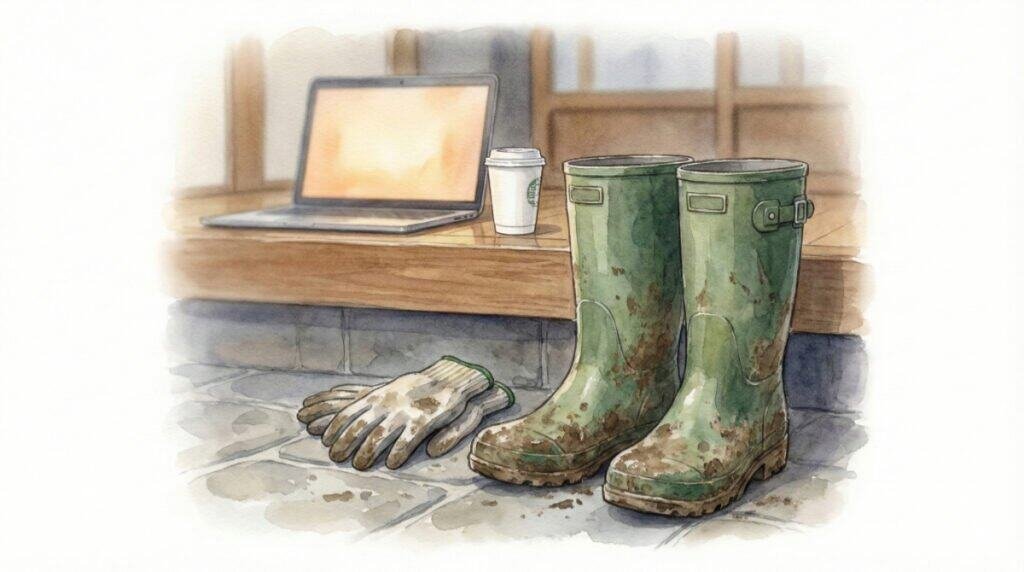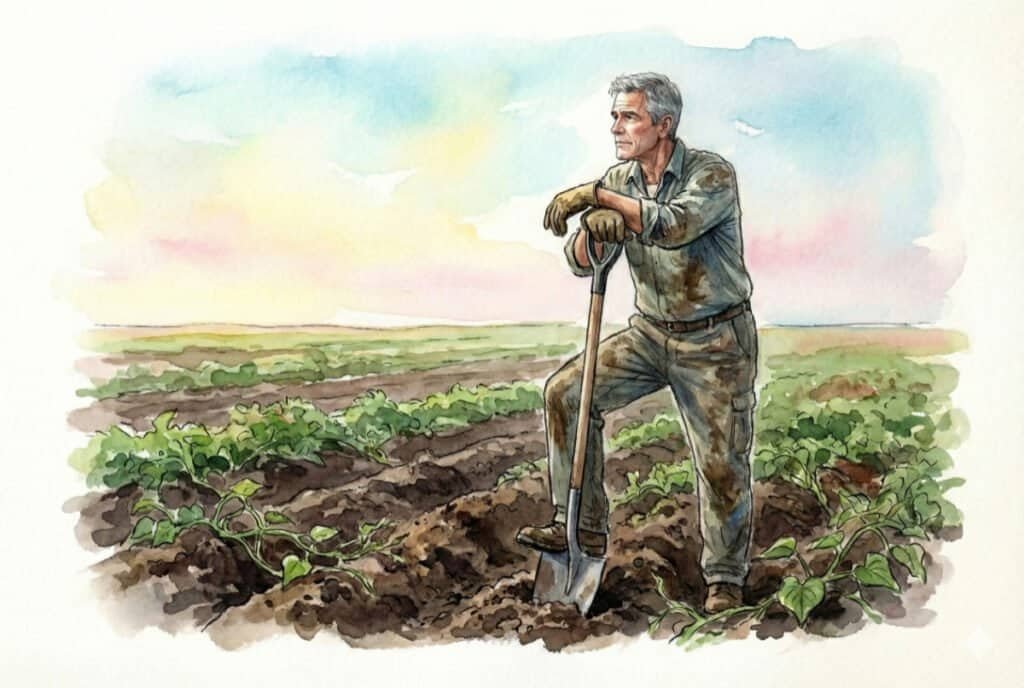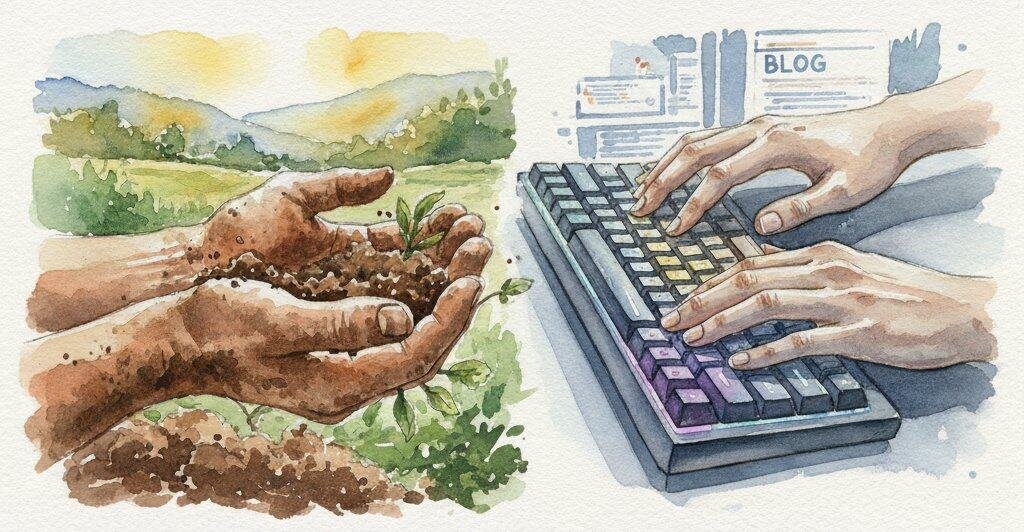Some of us have something in our lives that pulls harder than everything else: It doesn’t always make sense financially. It doesn’t fit neatly into our responsibilities. And it might not arrive at a convenient time. It’s just there – persistent, demanding attention, and quietly refusing to be ignored.
This post isn’t about productivity or time management. It’s about what happens when a passion won’t let go of your attention, and how you live with that tension without pretending it isn’t there.
Table of Contents
The Pull That Won’t Quit
This morning I spent five hours digging sweet potatoes. Real physical work – lifting, carrying, the kind that reminds you exactly how old your body is.
Afterwards, I showered, grabbed a coffee from 7-Eleven around lunchtime, and sat down at my computer.
Not to rest.
Not to zone out.
To work on the blog. Again.

That’s the part that keeps catching my attention. After physical exhaustion, after a full morning of honest work, my mind still pulls me toward the same place: writing, editing, tweaking, thinking about what I’m building here.
It’s not discipline. It’s not a schedule. It’s a pull.
When one thing pulls this hard, how do you juggle everything else?
Have you ever had something take over your attention even when logic says you should be focused elsewhere?
“It’s All About Balance”
Years ago, I worked as a caregiver for a quadriplegic friend. He was my boss, my roommate, and someone I genuinely respected.
He had every reason to be bitter about life’s limitations. Instead, he stayed calm under pressure, ambitious without being frantic, and thoughtful about how he spent his energy. He used to say, simply:
Coming from him, that phrase carried weight. This wasn’t motivational poster wisdom. It was lived knowledge from someone who had to manage competing demands with very real constraints.
I’ve carried that phrase with me for years. When I feel stretched thin or uncertain, I still hear his voice.
But here’s the question I keep circling back to:
What does balance mean when one thing refuses to stay in its lane?
My friend had no choice but to balance his ambitions with his limitations. Survival demanded it. But what about when the imbalance isn’t forced? What about when you’re choosing it – even knowing it might not be sensible?
The Drive That Doesn’t Make Sense
A few weeks ago, one of the schools I worked for closed. I lost students. Income dropped.
Logic says this is the moment to hustle, find new work, replace the lost income, and focus every spare hour on financial stability.
Instead, I keep coming back here. To the blog. To writing. To building something that doesn’t pay me anything right now.
Late nights tweaking CSS. Drafting posts in my head when I should be sleeping. Feeling oddly calm when rain cancels farm work because it means more time at the computer.

It’s not rational. And I’m not pretending it is.
I think part of it is a desire to build something long-term – something meaningful – even without immediate reward. Some kind of faith that steady effort will eventually matter, even if I can’t see how yet.
Or maybe it’s obsession dressed up as ambition. Honestly, it’s hard to tell sometimes.
What pulls at your attention even when logic says you should focus elsewhere?
What Won’t Let Go of You?
I doubt I’m alone in this.
For some people, it’s a creative project that doesn’t pay. For others, it’s learning something new when life is already full. Sometimes it’s a relationship that demands attention, a cause, or even the pull toward rest when responsibilities keep stacking up.
The specifics may differ, but the tension is the same: what demands your time versus what demands your attention.
The thing that won’t let go doesn’t always fit neatly into our plans. But it keeps showing up anyway.
When Finding Your Rhythm Isn’t About Equal Time
For me, the rhythm works like this.
Farming uses my body. Teaching uses my voice and attention. Writing uses my mind. Each draws from a different kind of energy, and strangely, they balance each other.
After hours in the field, sitting at the computer feels like rest – not escape, but a shift. Physical fatigue quiets the mental noise. Writing wakes something up that farming doesn’t touch.
There’s a quiet pleasure in moving between these modes. Hands in the soil one day. Fingers on keys the next.
The Focus Part

When I’m digging potatoes, I try to stay with the work. Time drags less when I’m present. It only feels heavy when I’m mentally somewhere else.
And yet, even when I’m focused, the pull remains. That quiet anticipation of getting back to the computer. Farming isn’t bad – it’s good, honest work. But the writing keeps calling.
The line between healthy devotion and unhealthy obsession gets blurry when you’re standing on it.
I don’t have a neat answer for where that line is. I only know this is the most engaged I’ve felt about anything in years.
How do you stay present with what’s in front of you when something else keeps calling?
The Honest Part About Money
Here’s where it gets uncomfortable to admit things plainly.
I work when work is offered. I take extra shifts. I teach when students need me. I’m not ignoring responsibility.
But I also make choices that don’t maximize income. I’ve stayed loyal to good people and smaller work environments longer than was financially optimal. I’ve chosen meaningful work over the highest possible pay more than once.
Part of that is who I am. I value relationships. I like working alongside people I respect. I don’t enjoy chasing the biggest paycheck at all costs.
That doesn’t mean money doesn’t matter – it does. It just means it’s not the only thing steering the ship.
My friend would probably still say, “It’s all about balance.”
Apparently, my version of balance involves accepting less certainty in exchange for work that feels honest, relationships that feel real, and time spent building something that matters to me – even if it doesn’t pay yet.
Have you ever chosen meaning over maximum profit? What made that choice feel worth it?
What About You?
I can’t be the only one living with this kind of pull.
Maybe you’ve found a rhythm that works – one where nothing takes over too much? Or, are you leaning hard in one direction while quietly hoping everything will work out?
Maybe the question isn’t how to balance everything perfectly. Maybe it’s accepting that your passion won’t let go because it needs a real place in your life.
I don’t have a clean answer. I’m still figuring it out.
What won’t let go of your time and attention right now?

Share your thoughts below. What’s your version of this?





